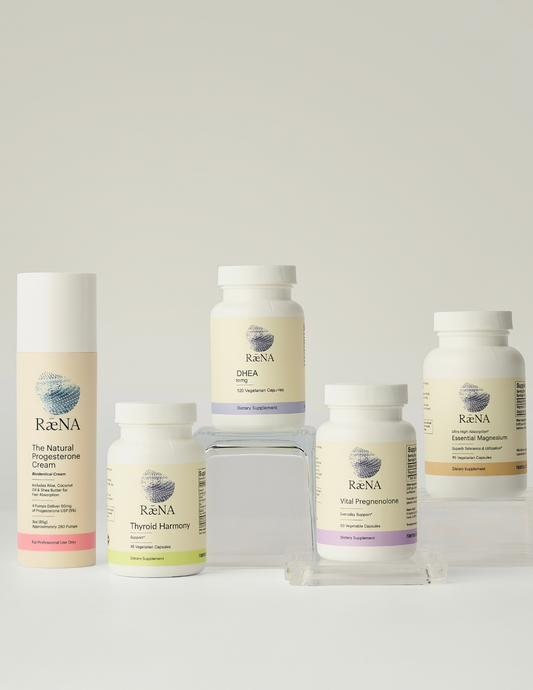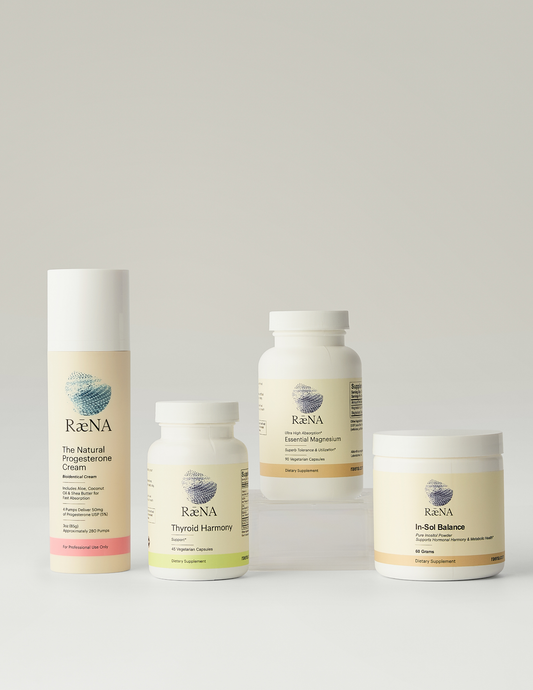
Ann Marie McQueen/Hotflash inc
daniel garcia1. Tell us a bit about yourself and your background, and how it relates to health?
I hit a wall in my early 40s — nightmares, terrible anxiety, feelings of doom and dread, sleep issues, intrusive thoughts, and even a fear of flying. I saw many doctors but no one mentioned perimenopause. It wasn’t until I missed a period at 47 that I realized what was happening. Since launching Raena Health, I’ve learned so much about progesterone’s role in our stress response and how trauma and lifestyle habits from earlier in life affect us as we age. I’m sure I had high estrogen and low progesterone, and I wish one of the doctors I’d seen had pointed that out. Alongside that, I brought two decades of IBS, unprocessed emotional stuff from childhood and early career, and like many of us, some unhealthy habits — binge drinking, overworking, overexercising, and avoiding emotional processing and shadow work. Now, I understand what happened and have worked hard to overcome it.
2. What specific hormones or hormone issues have you focused on?
My mom was a nurse, and she inspired me to focus on hormone health. She was an incredible person but often very ill — migraines, bladder and kidney infections, strep, mono, endometriosis, then chronic fatigue and fibromyalgia. At 53, the age I am now, she was diagnosed with pancreatic cancer and passed away three months later. I was 27 and starting my journalism career. Though I covered many topics, healthcare, science, alternative health, and wellness have always drawn me back. Looking back, I see how deeply that loss shaped my interest, especially the frustration and helplessness we felt back then.
3. How do you focus on your health routine?
Ignoring my IBS for years led to a health explosion during my late perimenopause: leaky gut, fatty liver, low thyroid and Hashimoto’s, insulin resistance, and pre-diabetes — all in someone who’d been considered “healthy.” To balance my hormones, I focused on digestion first. Moving from being chronically undernourished to nurturing good gut health and detoxification with an integrative physician helped balance all my hormones just like she said it would. It cleared most of my perimenopause symptoms, reduced inflammation, and even helped me lose 20 pounds. Looking back, I was really puffy and inflamed. I’m through menopause now and feeling pretty good.
4. How do you stay informed about the latest developments and research related to hormone health?
Good old Google Alerts and social media help, alongside my background as a journalist. I’m subscribed to many medical journal mailing lists, though I don’t subscribe to them all because of cost. Over time, I’ve become skilled at spotting what’s a genuine trend and what’s PR spin or marketing hype — sadly, there’s a lot of the latter.
5. Are there particular foods or dietary choices that you find helpful in maintaining hormone balance?
This often gets trashed on social media by doctors, but for me, eating one large carrot every day keeps me regular, and that keeps my whole system humming. I’m a big believer in making sure your digestive system works properly right down to your mitochondria — problems arise when it doesn’t.
6. Can you describe any stress-reduction techniques or practices you use to manage cortisol levels and stress-related hormones?
Morning walks and meditation are key. A consistent nighttime routine and minimizing screen time before bed help too. I’ve been using the app BrainWave for over a decade — it uses binaural beats to help wake up, fall asleep, calm anxiety, and reduce stress. It’s one of the most effective tools I’ve found. I’m also a fan of stretching or yin yoga before bed, which leads to great sleep. And great sleep really is the foundation of everything good.
7. Are there any specific lifestyle changes you've made to improve your hormone health that you'd like to share?
I’ve cut out many foods that disrupt my digestion, especially those with lectins. Certain nuts, too many greens, or hot peppers can trigger issues. My thyroid condition is mild, so I’m not on medication, but managing stress, sleep, exercise, and regular movement is crucial — otherwise I get hit hard. I walk a lot and try to move for 15 minutes after every meal. Morning light and catching sunsets help balance me as well. I quit drinking alcohol in 2022, which was pivotal. I avoid sugar and processed foods. Also, I’ve done a lot of emotional work, including exercises with The Workout Witch, Tension and Trauma Release (TRE), and 9D Breathwork. These have been vital for creating emotional and physical balance.
8. What advice would you give to someone who is just starting to explore hormone health and wants to establish a balanced routine?
I’d advise really focusing on being in your body and noticing how you feel. So many of us rush through life without connecting what we do or experience to our emotions and physical state. Learning to listen and talk to your body is key. My doctor, who’s trained in homeopathy and counseling, believes our bodies are always trying to get back into balance. After working with her and seeing results, I believe it too. If we can’t metabolize our hormones properly, how can we expect good health at any age?
9. What are your future goals and aspirations regarding your hormone health journey?
I’m currently considering hormone therapy — and what kind — for better health and longevity. Living in the Middle East has made it challenging to find doctors covered by insurance, and I’m hesitant about the expense and logistics of managing prescriptions outside insurance. I do wish telehealth options like those in the US were more accessible here. That said, I feel better now than I have in years, almost grateful for the health crisis I went through. I want to keep feeling the best I do on my most energetic days and to deepen the foundational habits that get me there.


